Thanks for reading Long Live the ABB: Conversation from the Crossroads of Southern music, history, and culture.
Who Am I?
I’ve seen an uptick lately in subscriptions and thought it would be good to reintroduce myself and my philosophy behind this Substack.
BOB BEATTY. Music obsessive. History geek. Southerner. Guitar player. Public historian. Teacher. Writer. Fan.


I grew up devouring Mom’s Beatles’ and Dad’s Hank Williams and bluegrass records. The blues was the first music I found on my own. Soon after, I discovered punk rock. All of those influences opened my ears to the Allman Brothers Band, a band that has endlessly fascinated me for more than 30 years.
I earned my Ph.D. at Middle Tennessee State University in 2018. Tennessee State Historian Carroll Van West was my dissertation advisor. My goal when I began to study under Dr. West as to write a book on Duane Allman. In October 2022, the University Press of Florida1 published my book Play All Night! Duane Allman and the Journey to Fillmore East.
A cultural entrepreneur, I spent 25+ years in senior leadership roles at history organizations before I founded the Lyndhurst Group, a firm that services history organizations, museums, and nonprofits.
As a public historian, a musician, a storyteller, and a family man, I focus on what brings people together as a community and as citizens of the world through the unending conversation.2
Play All Night! was one way to share what I learned.
This newsletter is another.
Play All Night! chronicles the founding era of the Allman Brothers Band.3 It’s a biography of the unique sound that is the Allman Brothers Band. At Fillmore East was Duane Allman’s masterpiece as a guitar player, a bandleader, and as an artist. My goal was to discover how we know that.
This newsletter is an expansion of that discussion, to look at the Allman Brothers Band in a deeper context, to better understand their unique place in the American cultural landscape.
Here are some recent examples of this:
Why their 1971 setlists only seem stagnant
Why August 14, 1973 is the Birth of Southern Rock4
Last Sunday Morning, the Sunshine Felt Like Rain
This past weekend I attended the memorial service of a very dear friend and colleague from the museum profession. Cinnamon had a tremendous impact on everyone she met, myself included.
I was the final speaker of the day5 and I shared with the group the song I always turn to whenever someone I love dies, “Ain’t Wastin’ Time No More.”
I played a bit of the song, from Dickey’s slide intro through the first chorus.
“Last Sunday morning, the sunshine felt like rain.
A week before, it all seemed the same.
With the help of God and true friends, I’ve come to realize.
I still have two strong legs, and even wings to fly.
You know I ain’t a-wastin’ time no more.
‘Coz time goes by like hurricanes, and faster things.”
“Ain’t Wastin’ Time No More” is the first song Gregg wrote after his brother’s death.
The lyrics express that Duane taught his brother and his bandmates the responsibility of the living to carry on.
Gregg reminded the band and its audience—including me—of that charge. But I never missed how Gregg said you get through whatever this life thing throws at you: God gives you friends to sustain you on the journey. Cinnamon was one of those friends for me, and I for her.
May you have similar people in your own life.
The 5-man band in the aftermath of Duane’s death
The first side of Eat a Peach is an unequivocal statement.
As Gregg wrote, “The music hadn’t died with my brother. The music was still good, it was still rich, and it still had that energy. It was still the Allman Brothers.”
The record begins with the aforementioned “Ain’t Wastin’ Time No More.” It’s a blues, for sure, but one that shares a hopeful note about pressing on through the pain.
“Les Brers in a Minor” follows. It’s far from hopeful.
There’s something sinister about it to me, a simmering anger about having to move on without Duane. I love the slow build up at the beginning, like a classical tune. I love that there’s no harmony guitar, just Gregg on B3 underneath Dickey. The band is unadorned. You can *feel* Duane’s absence, yet the music is so complete to me.
And then “Melissa,” the track that has named thousands of girls.6
Gregg said it was the first song he ever completed. It was a particular favorite of Duane’s, and Gregg played it at Duane’s funeral in his honor. Gregg also has it inscribed on his tombstone in Macon.
There’s a good chance all three of these songs would’ve made the album had Duane lived. Gregg had been working on the chords to “AWTNM” before his brother’s death, Dickey had been toying with the “Les Brers” riff since spring 1971. And, of course, “Melissa” was Gregg’s oldest song.
But had the group folded with Duane’s death or not completed Eat a Peach and toured so successfully behind it7 my life would be changed inexorably.
Which brings me to Long Live the ABB…
Many years ago I started signing off ABB-related discussions with “Long live the Allman Brothers Band.” I have no idea where I came up with the words, but the concept was always this: “The Allman Brothers Band didn’t die with Duane Allman, and I’m really, really glad for that.”
When I got hip to Duane and the ABB in the mid-1990s, I learned the group was very much a living, breathing entity. The music was different from the Duane era, but it stirred my soul similarly.
On November 13, 1993, I attended my first Allman Brothers Band concert at the Palm Beach County Fairgrounds.
I went expecting nostalgia and I left a lifelong convert. If the CDs I’d been listening to nonstop for most of the year already hadn’t done it, seeing the band live sure did! I was so flabbergasted I bought Wipe the Windows, Check the Oil, Dollar Gas8, a live collection from the post-Duane era I’d casually dismissed as inferior. “If they’re this good in 1993,” I remember thinking, “they had to be great in 1973!” They were.
You can blame BMG Music Club for providing the bait, but it was the Allman Brothers Band that set the hook. The music has offered me endless hours of joyous listening. I love how the musicians integrate themselves into the whole, how soloists conjure up astounding riffs on the fly, how the band plays behind the soloists—pushing and prodding them forward, backwards, even sideways. At times the guitars stand out; at other times, it’s the drums. Sometimes it’s Gregg’s vocals or the magnificent, swirling sound of his Hammond B-3.
Undergirding it all is a rock-solid foundation of ensemble playing, each musician making up his part as he goes along.
It is a musical conversation. And the Allman Brothers Band are among the premier musical conversationalists in the history of rock music.9
That’s the day I got on the bus, one of the best decisions of my life.
Not only because of the incredible music I heard from the various incarnations of the Allman Brothers Band. But I’ve also been introduced to music (old and new) and met some incredibly cool people, fellow travelers who have enriched my life immensely.
These connections all happened because the ABB was an active band throughout my entire adult life.10 The band kept a steady roster of ABBsolute KILLERS throughout that era, all of whom had their own bands and projects, muses I have followed with intentionality.
The ABB has been a fount of riches for me and I love sharing that with others.
I am also a historian who has spent the past quarter-century working with and for museums and history organizations. I have a lot of experience making the past relevant to a wider audience, it’s the core of my discipline. Just as a tour guide at a historic house, historians are interpreters of the past. And I seek to be that here on Substack.
What to expect from me
For a sense of what I mean by interpreter of the past
See my presentations in the Play All Night on the Road playlist on my Youtube channel
Anything marked INTERVIEW https://linktr.ee/longlivetheabb11
Byington Lecture on the Contemporary South
I explained how writing Play All Night and researching the Allman Brothers Band impacted me as a historian and as a southerner in “Lessons from Duane Allman’s Journey to Fillmore East,” at Mercer University in February 2023. It has timestamps if you want to skip around.12
Music is my sports, the Allman Brothers Band is my team
I started this newsletter because I love to write, I love music, I love the Allman Brothers Band, I love the South, I love culture (popular and highbrow). I can and do make endless connections to the Allman Brothers Band. It’s a fun way to see the world.
I’ve run into many others of you as well. And plenty of folks who share my love of observation of the world around me, particularly when it’s related to the ABB.
It was remarkable to me when I first learned the basic story of the band: Duane’s meteoric rise to fame, the band’s early years on the road building a following, Layla, At Fillmore East, Duane’s death, the 5-man band tour, Berry’s death, Brothers and Sisters, etc.
This particular road didn’t go on forever, but it continued for 45 years, 43 of them without their founder and leader.
It astounds me not only how much Duane accomplished in a month shy of 25 years on earth, but how his bandmates carried on without him, reaching unimaginable heights.
Play All Night is a deconstruction of At Fillmore East. In doing that, I was better able to understand Duane Allman as an artist and the Allman Brothers Band as a band.
Long Live the ABB is my conversation about those findings. The unending conversation is the most interesting part of the entire equation for me. My goal is to spur thought and conversation not only with me, but also with those in your world.
The music is what got me first. But it was the story that kept me around.
And, of course, I got a chance to participate in it. Because to the ABB and the bands they’ve begotten, the audience is an important part of the equation.
Likewise for my writing. I’m here for myself first. I’m writing something I’d like to read. Something that expresses my own unique view of the world around me. I learned this from a lot of places, but of course there’s an ABB source: Butch Trucks.
The band-audience dynamic began with the musicians first playing for themselves. “We’re up there playing for ourselves first and foremost,” said Butch. “If I’m not getting myself off, how can I expect anyone else to get off on it? I start with myself then move out to the guys in the band, and then we start communicating. We kick it into overdrive and go into places that we can’t go by ourselves.” ~ Butch Trucks from Play All Night p112
Around here, the “other guys in the band,” are the folks in my band: characters you’re sure to meet over the coming months and years.
They include actual musician bandmates, and countless collaborators, bandmates from all phases of my life, family, friends who are family, professional historians, and myriad fellow travelers I meet along the way.13
Not just friends who understand important details such as:
Dickey Betts was more than just Duane’s foil—he was one of the finest composers of his generation and
Berry Oakley was as much a visionary as Duane and set a standard for lead bass.
Among other things, these “bandmates” know things like:
Allen Woody was equally as important as Warren Haynes to the 1989 Dreams reunion
Jack Pearson is one of the finest guitarists who ever walked planet earth.14
And, of course, anyone who saw the Allman Brothers Band live during any era speaks highly of it—even those who saw the 1981-2 Toler Brothers lineup without Jaimoe.15
Most of these folks will recognize their inspiration when I post something. Sometimes I make it obvious. I have an ulterior motive when I’m explicit about where ideas come from: I want to share a bit with the world about process.
Here are some examples of that from the archives:
“My Latest Musical Obsession” Tyler Childers 2023 Stagecoach set
“When Musical Worlds Collide” a Ziggy Marley/Tedeschi Trucks Band collaboration
One last thing
Wanted to alert each of you to the Play All Night Playlist Project, playlists I’ve created to go along with each chapter of Play All Night! Duane Allman and the Journey to Fillmore East.
This link is the master list of all of the playlists. I keep this updated as I add to the list. For the most part, the liner notes are reserved for subscribers, but the playlists themselves are all above the paywall.
Alright, that should give you a sense of what I’m doing here. If you like the content, consider a paid subscription or put a tip in the tip jar.
Thanks for reading.
Go Gators!
The Unending Conversation is rhetorical concept I learned my first semester of graduate school (1997).
Roughly March 1969 through November 1972. Most folks would say March 1969 through Duane’s death October 29, 1971. I extend that time period to include the 5-man band that toured without Duane throughout 1972. Berry Oakley’s death November 11, 1972 and Linda Oakley’s eviction from the Big House in January 1973 closed that original chapter for good.
I reserve the right to change my mind on this. (And I will.)
This is the eulogy I delivered. Her memory is definitely a blessing.
Shout-out to Donna, Pete, and the UCF student who attended my lecture.
A grueling pace that gave little time for grief or reflection and probably cost Berry Oakley his life.
Wrote about Wipe the Windows recently
No shit, they reformed in 1989, the year I turned 18!
My favorite all-time interview was one I gave in the middle of my Florida tour to launch the book. My dude Sebastian, a rising star in the public history field and Play All Night made him an ABB convert!
I begin with a dedication to my colleague Cinnamon whose memorial I spoke at last weekend.
I borrowed this concept from Mike Nesmith of the Monkees, who called all his projects “bands” in his memoir, Infinite Tuesday: An Autobiographical Riff. A wonderful book btw.
Don’t believe me? Check out “High Falls 7/2/98” (courtesy of the late Jules Fothergill).
Shoutout to Alan Paul, Sawyer, Daryl M., and LostInTheGrooves. Alan’s article on his first show is pretty great.

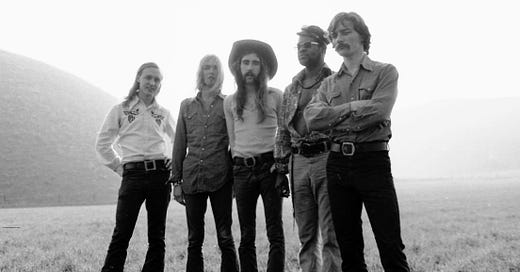


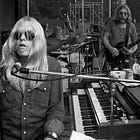
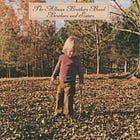

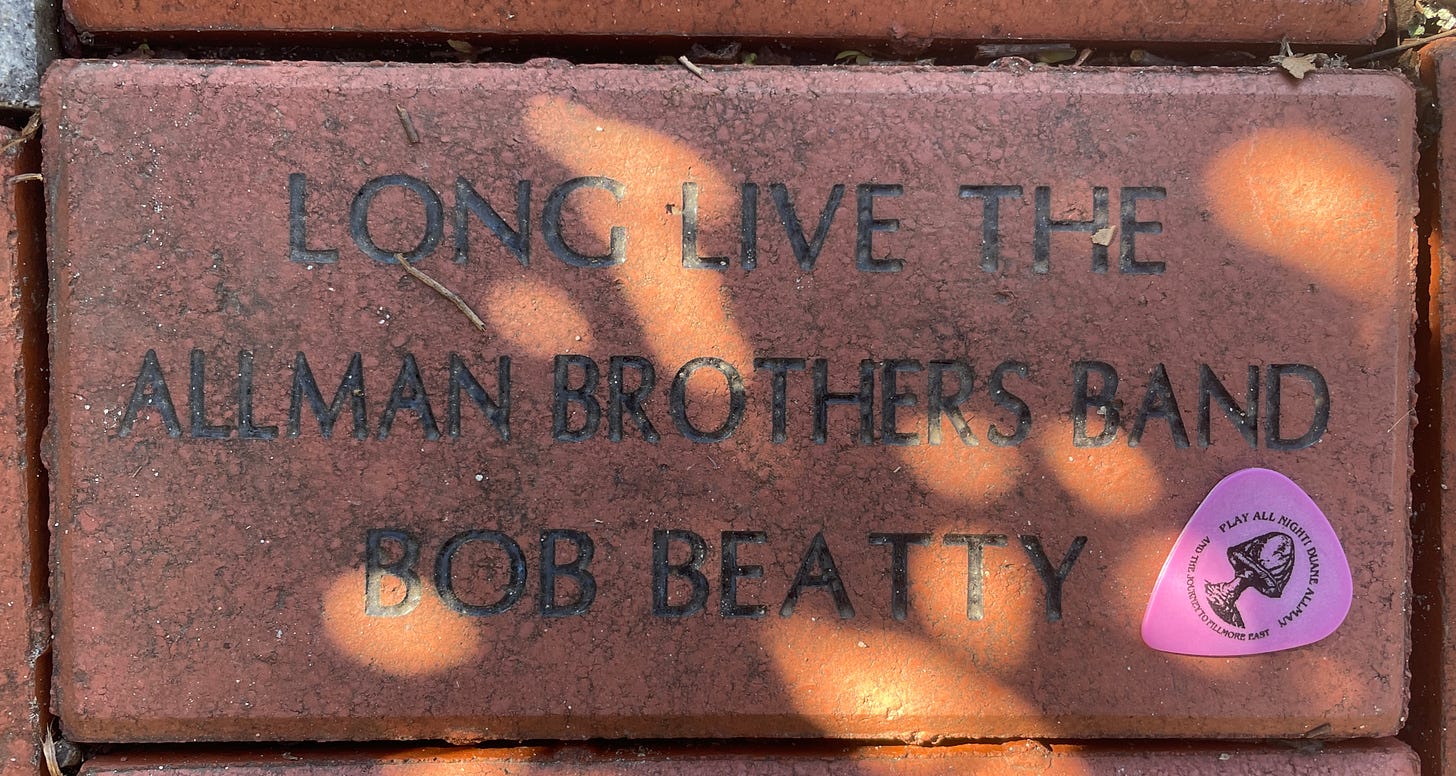
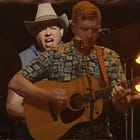
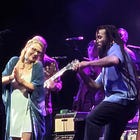
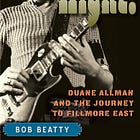
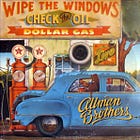
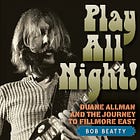
"soul stirring" is the perfect description.
I've been following you and the book on Instagram and found you here too. I learned of the Fillmore East and Layla albums in 1972, age 15. Listened obsessively and finally told my sister (who owned the LPs), "it seems like you get the very same lick at the end of You Don't Love Me and in Why Does Love Got To Be So Sad?. She says, "yeah because it's the same guy, Duane Allman. It's really too bad he died." My heart sunk and it hurt. I thought 24 was pretty damn mature but knew it wasn't a time for dying.
First chance I got to see them was at Metropolitan Stadium in Bloomington, MN, in fall of 1974. I still remember Dickey in a full white suit playing his goldtop and when they flooded him with golden light just as he really Hit The Note in Jessica! And Gregg just suddenly standing up from his bench as if he must be on his feet for whatever they're laying down right now! Followed avidly in every way ever since and I've read and heard most everything too, saving a couple recent books.
Well, I enjoy your stuff but I have to say, there are sometimes little blind spots or omissions or sequence errors on a detail here and there that will just snap me to attention. Can't think of any now and there are more from others than from you. There's no substitute for having been there and many ABB writers and researchers are much younger than me. I always try to comment in some way to help out. So I'll be here in case anything doesn't go down smooth to see about getting things straight. Mostly based on my 51-year memories of my favorite band, favorite musicians, and favorite subject. (I'm the guy who wishes Derek would go back to a small combo of the best musicians and with only Mike singing. I mean, the kids must be out of high school by now. And Susan was ten years older than little 19 year old, inexperienced Derek...)